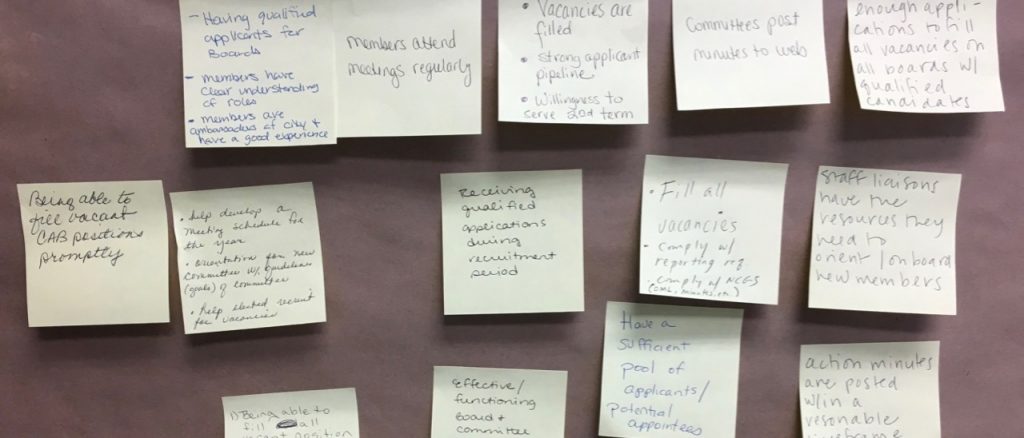
We’re glad to offer some reflections here on the workshop Working with Citizen Advisory Committees and Boards we hosted at the School of Government on May 5th. The workshop consisted of a group of 28 very engaged participants from across North Carolina. These folks were a wonderful, diverse group: elected officials, city and county clerks, program managers, a council of government official, NC Cooperative Extension advisor and appointed members of citizen advisory committees or boards (we’ll use CABs here, for short). In other words, we had, in the room together, virtually all aspects of local government CABs: participants, staff support, and elected officials that create the CABs and seek to utilize their input.
We designed the workshop as a collaborative or peer learning experience. There was some traditional instruction, including excellent presentations by School of Government faculty Trey Allen on the legal aspects of CABs and Margaret Henderson on understanding the mindset of community volunteers. Most of the time, however, was dedicated to participants in the workshop learning from each other: identifying common struggles as well as promising practices.
Here are a few thoughts about the expected and unexpected parts of the workshop:
- People (elected officials and staff in local government, as well as civic-minded citizens) are committed to public participation and are trying many methods to “get it right”
- They never feel they do get it right. There is constant flux of membership and commitment by citizens to advisory boards. Results seem universally mixed.
- Consistent practices around CABs remain elusive. Those closest to CAB work realize the importance of clear goals, timely training, and effective recruitment, for example, but the ‘real world’ of practice is rarely near the ideal.
- Thinking about improving diversity in ways other than CAB membership. One participant suggested having CAB liaisons to neighborhoods, or to specific racial/ethnic groups or other under-represented residents. Participants recognized that it is hard to commit to monthly meetings, usually at night, which is how many CABs operate. But there was widespread recognition of the value-add of more diverse CABs.
- Re-thinking the need for or utility of CABs for local governments. The City of Asheville is about to review the number and responsibilities of its CABs. Similar work was done a few years ago in Transylvania County which reduced the number of CABs from 40 to 25. This is hard work: a CAB is just one way for a local government elected board to get input. But once created, it is difficult to ‘sunset’ these groups, even if their purpose is no longer clear. And seeming – in any way – to “say ‘No’” to a mechanism for citizens to influence local government has inherent risks.
- At the same time, and perhaps paradoxically given #2 above, was a theme heard throughout the workshop of was how hard it is to get and keep citizens for certain CABs. Recruiting a knowledgeable and diverse pool of volunteers for CABs is often a challenge. Local officials need to be creative on this front and also consider how to leverage other programs, like citizens academies, as a way to broaden applicant pools.
The bottom line is that CABs are ubiquitous across the local government landscape, yet there has been little systematic research on the topic. Local governments across North Carolina (and, presumably, the United States) dedicate a great deal of staff time to their maintenance, yet the results or payoff for that effort (by staff and by volunteers) is inconsistent at best.
The workshop uncovered or reinforced some promising practices as well as helped frame some of the key issues with CABs. These results will be presented in a workshop report which will be posted on the workshop homepage by the end of July, 2017. We plan to use the results of that workshop as a launching off point for further research into a practice that begs for more systematic research.
If you have suggestions on questions we should be asking or practices that seem particularly promising, please share them in the comments section below.

